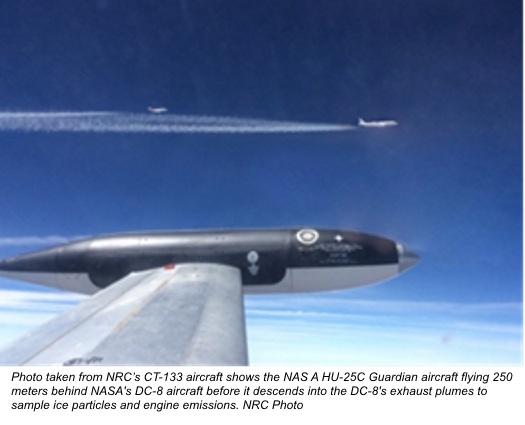Estimated reading time 2 minutes, 36 seconds.

The National Research Council of Canada (NRC) joined the National Aeronautics and Space Administration (NASA) and the German Aerospace Center (DLR) in NASA’s Access II project to conduct a series of flight tests designed to study the effects on emissions and contrail formation of burning alternative fuels in jet engines.
In May 2014, NRC’s CT-133 research jet flew from the Armstrong Flight Research Center in Edwards, Calif., to measure emissions from NASA’s four-engine DC-8 jet. The NRC research aircraft flew in formation with the NASA Hu-25 and DLR Falcon 20E at typical commercial flight altitudes between nine and 12 kilometers.
Behind the DC-8, NRC’s CT-133 flight crew investigated the dynamics of the DC-8’s wake turbulence and measured various emissions from its engine exhaust jets, while DLR and the NASA Falcon measured the composition of the exhaust gas. The distance between the aircraft during testing varied from 100 metres to 20 kilometres. As a rugged military trainer jet, NRC’s CT-133 was able to fly through the DC-8 emissions plume and trailing vortices to measure emissions species and contrail ice in the vortices.
The research aircraft were able to obtain in-flight emission measurements and contrail characteristics from the DC-8 jet, burning both conventional jet fuel and blended alternative fuels. They measured the emissions of the biofuel-JetA mixture and its effects on the formation and properties of condensation trails at typical commercial flight altitudes. NRC’s CT-133 measured the concentration effect of the DC-8 trailing vortices, upon several emission species and the longevity of contrail ice particles in their vicinity.
“NRC is pleased to be a part of this international partnership, making significant contributions to alternative fuels research with our unique testing capabilities,” said John R. McDougall, president of the National Research Council of Canada. We look forward to continuing our work with these elite collaborators in our efforts to find more fuel-efficient solutions for the global aerospace industry, ultimately, reducing costs and increasing industry productivity.”
The results obtained from the joint flight tests will be shared and reported to the International Forum for Aviation Research. For more information about our aerospace research and development expertise, visit: www.nrc.gc.ca/aerospace.








